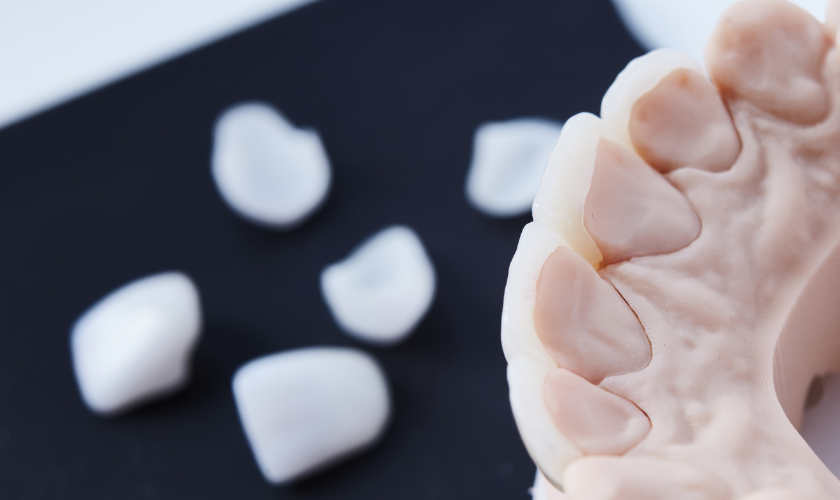
Know What You Should do If Your Veneer Falls off!
Are you experiencing a dental dilemma? Has your veneer suddenly decided to take a vacation from your smile? Well, fret not my friend, because in this blog post, we’re going to tackle the issue head-on. Losing a veneer can be an unexpected and frustrating experience, but fear not! We’ve got you covered with some expert advice on what steps to take when your veneer falls off. So buckle up and get ready to restore that picture-perfect smile of yours!
Steps To Take If Your Veneer Falls Off
Step 1: Consult with a Dentist
When your veneer falls off, the first thing you should do is schedule an appointment with your dentist. They are the dental experts who can provide guidance and professional advice on how to proceed. Don’t try to fix it yourself without consulting them first.
Step 2: Repair Veneer at Home (with caution!)
If you can’t get immediate access to a dentist, there are some temporary measures you can take at home. Gently clean the inside of the veneer and your tooth with warm water, being careful not to damage or break anything further. Once cleaned, you might be able to temporarily reattach the veneer using over-the-counter dental adhesive or denture adhesive.
Step 3: Reassemble Veneer with Glue (as a last resort)
In some cases, if the damage isn’t severe and there’s no risk of swallowing or choking on broken pieces, you may choose to use glue as a temporary solution until you see your dentist. However, this step should only be taken as a last resort and under extreme caution.
Remember that these DIY solutions are just temporary fixes until you can visit a dental professional who will assess the situation properly and provide appropriate treatment options for long-term restoration.
Now that we’ve covered what steps to take if your veneer falls off in an emergency situation let’s move on to our next section where we’ll discuss why consulting with a dentist is crucial in such situations! Stay tuned!
Consult with a Dentist
When your veneer falls off, it’s essential to consult with a dentist as soon as possible. A dentist is the best person to assess the situation and provide guidance on how to proceed. They have the expertise and knowledge to evaluate the condition of your veneer and determine if it can be repaired or needs replacement.
During your consultation, the dentist will examine your teeth and evaluate whether any underlying issues caused the veneer to fall off. They may take X-rays or use other diagnostic tools to get a comprehensive understanding of your oral health.
Based on their assessment, the dentist will recommend appropriate treatment options. If the veneer is intact, they may simply reattach it using dental adhesive. However, if there are signs of damage or decay, they might advise replacing it entirely.
It’s crucial not to attempt DIY fixes at home when dealing with a fallen-off veneer. Only a qualified dental professional can ensure proper restoration while preserving long-term oral health.
Remember that seeking prompt professional advice from a dentist is key in resolving this issue effectively and preventing further complications down the line.
Repair Veneer at Home
If your veneer has fallen off, you may be wondering if it’s possible to fix it yourself. While it’s always best to consult with a dentist for professional advice, there are some steps you can take to temporarily repair the veneer at home.
Carefully remove any remaining adhesive from both the tooth and the back of the veneer using a soft cloth or dental floss. Be gentle during this process to avoid causing any damage.
Next, clean the area thoroughly with water and a mild soap. This will ensure that there is no debris or bacteria present that could interfere with the bonding process.
Once cleaned, apply a small amount of denture adhesive or temporary dental cement onto the back of the veneer. Carefully place the veneer back onto your tooth, applying gentle pressure to help it adhere properly.
It’s important to note that this DIY repair is only temporary and should not replace professional treatment. Make sure to schedule an appointment with your dentist as soon as possible for proper reattachment or replacement of your veneer.
Remember, while these steps may provide a quick fix in emergency situations, seeking professional help is always recommended for long-term solutions when dealing with dental issues like fallen-off veneers.
Reassemble Veneer with Glue
Reassembling your veneer with glue can be a simple and effective solution if it falls off. Here’s how you can do it:
First, make sure to clean the inside of the veneer and the tooth surface where it will be attached. This will ensure proper adhesion.
Next, apply a small amount of dental adhesive or denture adhesive to both surfaces. Be careful not to use too much, as excess glue can cause discomfort or interfere with your bite.
Carefully align the veneer with your tooth and press down firmly but gently. Hold it in place for a few minutes to allow the glue to set.
Once the glue has dried, check that the veneer is securely attached. If there are any uneven edges or gaps, you may need to remove excess glue using a dental floss or an interdental brush.
It’s important to note that reassembling a veneer with glue should only be considered as a temporary fix until you can see your dentist for professional repair. They will assess the situation and determine if further adjustments are needed.
Remember, DIY repairs should always be approached with caution. It’s best to consult with your dentist before attempting any at-home fixes for dental issues like a fallen-off veneer.
Final Words
In the unfortunate event that your veneer falls off, it’s important to take immediate action. Remember, a loose or missing veneer can not only affect your smile but also cause discomfort and potential damage to your underlying tooth. Here are some final words of advice on what you should do if your veneer falls off.
First and foremost, consult with a dentist as soon as possible. They will be able to assess the situation and provide professional guidance on how to proceed. Attempting DIY repairs may lead to further damage or improper reattachment of the veneer.
If you’re unable to see a dentist right away, there are temporary measures you can take at home until you get professional help. Avoid chewing on that side of your mouth to prevent any additional damage or irritation.
When handling the loose veneer, be careful not to drop it or mishandle it in any way. Clean both the inside surface of the veneer and your tooth with warm water without using any cleaning agents.
To temporarily reassemble the veneer, use over-the-counter dental adhesive or denture adhesive powder available at most pharmacies. Apply a small amount according to package instructions and carefully place the veneer back onto your tooth using gentle pressure.
Remember that these home remedies are only temporary solutions until you can visit a dentist for proper repair/replacement options.
Dealing with a fallen-off veneer can be stressful, but taking prompt action is crucial in maintaining good oral health and restoring your smile’s appearance. Consulting with a dentist is always recommended for appropriate treatment options tailored specifically for you.
As we come to the end of this blog post, it is important to remember that dealing with a fallen veneer can be a stressful situation. However, by following the steps outlined above, you can take the necessary actions to address the issue effectively.
Remember, consulting with a dentist should always be your first course of action. They will provide professional guidance tailored specifically to your situation and ensure that any underlying dental issues are addressed.
If repairing the veneer at home is an option for you, make sure to follow proper instructions and use appropriate materials. Take your time and be gentle during the process to avoid causing further damage.
Reassembling the veneer using adhesive glue can provide a temporary fix until you can visit your dentist for a more permanent solution. Just make sure to choose a non-toxic glue suitable for dental applications.
While it may be disheartening when your veneer falls off, there are steps you can take to remedy the situation. By seeking professional advice from your dentist and taking cautious measures at home if necessary, you’ll soon have that beautiful smile back in no time!
FAQ
Q: Can I fix a veneer that has fallen off at home?
A: While it is possible to temporarily repair a veneer at home, it is highly recommended to consult with a dentist for proper treatment. A DIY fix may not provide long-lasting results and could potentially cause further damage.
Q: How long does it take to repair a veneer?
A: The time taken to repair a veneer will depend on the extent of the damage and the specific treatment required. In some cases, it may be possible to reattach the veneer in one appointment. However, if additional work is needed or if a new veneer needs to be fabricated, multiple visits may be necessary.
Q: How much does it cost to fix a fallen-off veneer?
A: The cost of repairing a fallen-off veneer can vary based on factors such as location, dentist’s expertise, material used for repairs, and any additional treatments required. It is best to consult with your dentist who can provide you with an accurate estimate after evaluating your specific situation.
Q: Can I prevent my dental veneers from falling off?
A: While accidents happen and unforeseen circumstances can cause dental veneers to fall off, there are steps you can take to minimize the risk. These include practicing good oral hygiene by brushing twice daily and flossing regularly, avoiding biting into hard objects or using teeth as tools, wearing protective mouthguards during physical activities that could pose risks of injury.



